
The First Intifada or First Palestinian Intifada, also known simply as the intifada or the intifadah, was a sustained series of protests and violent riots carried out by Palestinians in the Palestinian Territories and Israel. It was motivated by collective Palestinian frustration over Israel's military occupation of the West Bank and the Gaza Strip, as it approached a twenty-year mark, having begun after Israel's victory in the 1967 Arab–Israeli War. The uprising lasted from December 1987 until the Madrid Conference of 1991, though some date its conclusion to 1993, with the signing of the Oslo Accords.

Gustave Flourens was a French Revolutionary leader and writer, son of the physiologist Jean Pierre Flourens. He was also the elder brother of Émile Flourens, who became minister of foreign affairs under the Third Republic.
Abu Musab al-Suri, born Mustafa bin Abd al-Qadir Setmariam Nasar, is a suspected Al-Qaeda member and writer best known for his 1,600-page book The Global Islamic Resistance Call. He has held Spanish citizenship since the late 1980s following marriage to a Spanish woman. He is wanted in Spain for the 1985 El Descanso bombing, which killed eighteen people in a restaurant in Madrid, and in connection with the 2004 Madrid train bombings. He is considered by many as 'the most articulate exponent of the modern jihad and its most sophisticated strategist'.
The Arab–Israeli conflict began in the 20th century, evolving from earlier Intercommunal violence in Mandatory Palestine. The conflict became a major international issue with the birth of Israel in 1948. The Arab–Israeli conflict has resulted in at least five major wars and a number of minor conflicts. It has also been the source of two major Palestinian uprisings (intifadas).

Arab League–Iran relations refer to the political, economic, and cultural ties between the League of Arab States and the Islamic Republic of Iran. The former is a regional organization composed of 22 Arab states in MENA with a combined majority of Sunni Muslims, whereas the latter is a country in Western Asia with a majority of Shia Muslims.
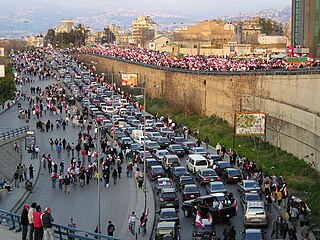
The Syrian occupation of Lebanon began in 1976, during the Lebanese Civil War, and ended on 30 April 2005 after the Cedar Revolution and several demonstrations in which most of the Lebanese people participated, and the withdrawal agreement was signed by President Bashar al-Assad and Saad Hariri, son of Rafic Hariri. All of these changes were a result from the assassination of former Lebanese Prime Minister Rafic Hariri.
James L. Gelvin is an American scholar of Middle Eastern history. He has been a faculty member in the department of history at the University of California, Los Angeles (UCLA) since 1995 and has written extensively on the history of the modern Middle East, with particular emphasis on nationalism and the social and cultural history of the modern Middle East.

The Arab–Israeli conflict is an ongoing intercommunal phenomenon involving political tension, military conflicts, and other disputes between Arab countries and Israel, which escalated during the 20th century, but had mostly faded out by the early 21st century. The roots of the Arab–Israeli conflict have been attributed to the support by Arab League member countries for the Palestinians, a fellow League member, in the ongoing Israeli–Palestinian conflict; this in turn has been attributed to the simultaneous rise of Zionism and Arab nationalism towards the end of the 19th century, though the two national movements had not clashed until the 1920s.
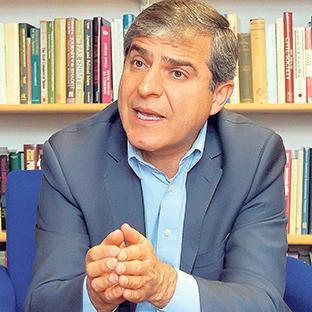
Fawaz A. Gerges is a Lebanese-American academic and author with expertise on the Middle East, U.S. foreign policy, international relations, Al Qaeda, and relations between the Islamic and Western worlds.
Rashad al-Shawwa was the Palestinian mayor of Gaza for eleven years from 1971 to 1982. Before becoming mayor he was an outgoing local activist in the city. He was known by Israelis and Palestinians as the pro-Jordanian "father figure" of the Gaza Strip. He is the father of artist Laila Shawwa.
Sherifa D. Zuhur is an academic and national security scholar of the Middle East and Islamic world. She was most recently a visiting scholar at the Center for Middle East Studies, University of California, Berkeley and is the director of the Institute of Middle Eastern, Islamic and Strategic Studies.
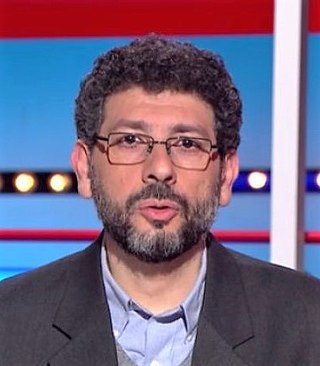
Ziad Majed is a Lebanese/French political researcher and university professor. He holds a PhD in political sciences from Sciences Po Paris.
The Arab Cold War was a period of political rivalry in the Arab world from the early 1950s to the late 1970s as part of the broader Cold War. The generally accepted beginning of the Arab Cold War was the Egyptian revolution of 1952, which ultimately led to Gamal Abdel Nasser becoming President of Egypt in 1956. Thereafter, newly established Arab republics defined by revolutionary secular nationalism, and largely drawing inspiration from Nasser's Egypt, were engaged in political rivalries of varying degrees of ferocity with conservative traditionalist Arab monarchies, led chiefly by Saudi Arabia. The approximate end point of this period of internecine rivalry and conflict is generally viewed as being the 1979 Iranian Revolution, which culminated in the installation of Ayatollah Ruhollah Khomeini as the leader of Iran's theocratic government. Thereafter, the bitterness of intra-Arab strife was eclipsed by a new era of Arab-Iranian tensions.
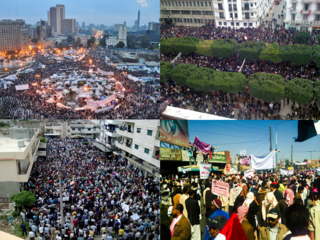
The Arab Spring was a series of anti-government protests, uprisings and armed rebellions that spread across much of the Arab world in the early 2010s. It began in Tunisia in response to corruption and economic stagnation. From Tunisia, the protests then spread to five other countries: Libya, Egypt, Yemen, Syria and Bahrain. Rulers were deposed or major uprisings and social violence occurred including riots, civil wars, or insurgencies. Sustained street demonstrations took place in Morocco, Iraq, Algeria, Lebanon, Jordan, Kuwait, Oman and Sudan. Minor protests took place in Djibouti, Mauritania, Palestine, Saudi Arabia and the Moroccan-occupied Western Sahara. A major slogan of the demonstrators in the Arab world is ash-shaʻb yurīd isqāṭ an-niẓām!.

The Syrian National Council, sometimes known as the Syrian National Transitional Council or the National Council of Syria, is a Syrian opposition coalition, based in Istanbul, Turkey, formed in August 2011 during the Syrian civil uprising against the government of Bashar al-Assad.

The Syrian opposition is the political structure represented by the Syrian National Coalition and associated Syrian anti-Assad groups with certain territorial control as an alternative Syrian government.
Ḥusayn Pasha ibn Ḥasan ibn Aḥmad ibn Riḍwān ibn Muṣṭafā ibn ʿAbd al-Muʿīn Pasha was the Ottoman governor of Gaza Sanjak, a district which extended from Jaffa and Ramla in the north to Bayt Jibrin in the southeast and Rafah in the south, with Gaza as its capital. Husayn belonged to the Ridwan family, who long held the governorship of Gaza. Husayn Pasha became governor in 1644 after succeeding his father 'Arab Hasan Pasha. He served, with a brief interruption by his son Ibrahim in 1660, until his imprisonment in 1662. Husayn Pasha also served intermittent terms as governor of Nablus and Jerusalem and as amir al-hajj. Gaza prospered under Husayn Pasha and its political importance rose so much so that the French consul considered it to be the virtual capital of Palestine. Husayn Pasha maintained friendly relations with the Bedouin tribes of the region, local Christian communities and the French. In 1662, Husayn Pasha was imprisoned by the Ottoman imperial authorities and executed in Damascus later that year or in Constantinople in 1663.

Bassma Kodmani is a Syrian academic and former spokesperson of the Syrian National Council. She is the executive director of the Arab Reform Initiative, a network of independent Arab research and policy institutes working to promote democracy in the Arab world.
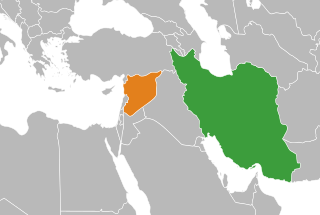
Syria and Iran are strategic allies. Syria is usually called Iran's "closest ally", with ideological conflict between the Arab nationalism ideology of Syria's secular ruling Ba'ath Party and the Islamic Republic of Iran's pan-Islamist policy notwithstanding. Iran and Syria have had a strategic alliance ever since the Iran–Iraq War, when Syria sided with non-Arab Iran against neighbouring Ba'ath-ruled Iraq. The two countries shared a common animosity towards then Iraqi president Saddam Hussein and coordination against the United States and Israel.

Noura Erakat is an American activist, university professor, legal scholar, and human rights attorney. She is currently an associate professor at Rutgers University, specializing in international studies. With her primary focus being the Israeli–Palestinian conflict, she is a vocal critic of the State of Israel.












